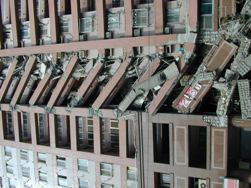
Geoscientist 21.2 March 2011
The number of people killed in earthquakes has soared in recent decades. True, global populations are also rising, and the flight to megacities worldwide continues. But, as Dr Nick Ambraseys (Imperial College) and Prof. Roger Bilham (University of Colorado) have revealed in a stunning analysis published in Nature in January
1, that is only part of the explanation.
Most of society’s evils – ill health, premature death, ignorance, prejudice etc. - boil down to poverty, so it comes as no surprise to learn that most of the 18,300 people who, on average, die each year for lack of adequately earthquake-engineered building, are poor. But even that isn’t the whole story.
By and large, the poorer a country is, the more corrupt it is too. How do we know? Because an organisation called Transparency International estimates it in the Corruption Perception Index. This, plotted against national average income, produces some strikingly high positive correlations.
The data do not plot on a nice neat regression line, however. Some countries are more, some less corrupt than might be expected, given their average incomes. And if you mark those countries that have recently lost citizens in buildings that collapsed in earthquakes, you find that 83% of all such deaths over the last 30 years have occurred in anomalously corrupt states – such as Afghanistan, Turkey, Greece, Taiwan, Haiti, Italy, Mexico, and Iran.
All buildings are, by their very nature, huge, expensive cover-ups. Therefore, any lack of moral integrity in builders spreads easily, like an exceptionally aggressive cancer, into the structural integrity of whatever they erect. From bribes to underpaid officials to the use of substandard materials, abundant motive and opportunity conspire with low detection and prosecution rates to make the construction industry the most corrupt segment of the global economy, according to Oxford Economics
2. And it is killing people.
Curing the cause won’t cure the disease however. Historic corruption has become fossilized in the building stock of a host of earthquake-prone countries. In Taiwan in 1999, some tower blocks collapsed because industrial margarine drums had been used to pack out their concrete walls. Deathtrap buildings linger on for decades. There is only one answer: namely, strong, adequately funded government regulators. But what price future safety in a very present global recession?
REFERENCES
- Corruption Kills, By Nicolas Ambraseys and Roger Bilham Nature 13 January 2011 v469, pp153-155
- Global Construction 2010: A Global Forecast for the Construction Industry over the Next Decade to 2010. (Global Construction Perspectives and Oxford Economics, 2010)